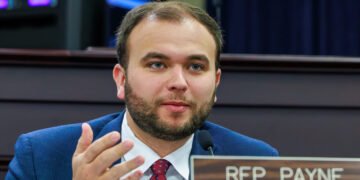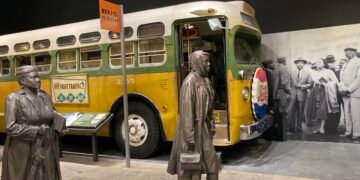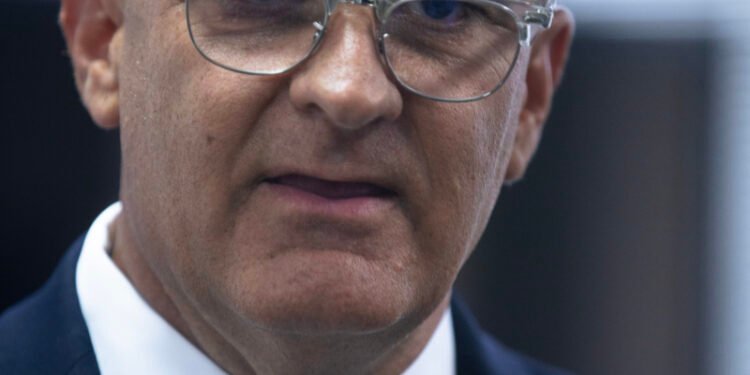To supporters, Robby Mills is a straight-shooter who will never vote against his convictions.
“What you see is what you get,” said Henderson County Judge-Executive Brad Schneider. “He stands by what he believes in.”
His detractors, meanwhile, see him in a completely different way. Mills, himself, said he’s often been called “hateful.”
In an interview with the Hendersonian in late July, just barely more than a week after being announced as Republican gubernatorial candidate Daniel Cameron’s running mate, the Henderson state senator seemed to shrug off the contentiousness that often follows him, saying that’s the nature of partisan politics.
“My skin has gotten really thick,” he said. “I feel like I’m speaking truth.”
It’s his truth, his core as a conservative and Christian, that often pushes him to go after legislation that opposition characterizes as hurtful.
Several times, Mills said, people have protested in front of his business, Nu-Look Cleaners on Second Street. In 2018, votes on teacher benefits and education funding cast by Mills as a state representative incurred the anger of many educators, leading to one such protest.
In the General Assembly session that ended in late March, he strongly supported Senate Bill 150, which does not allow minors to seek gender-affirming care even with parental approval and prohibits the discussion of LGBTQ issues in schools. It included many other provisions the LGBTQ community and allies vehemently opposed. The bill drew ire and protests in Frankfort.
It’s not the first time his views have spurred controversy with the LGBTQ community. In his initial term as a member of Henderson’s Board of Commissioners in 1999, the introduction of a vote on the Fairness Ordinance riled the community—angry letters to the editor, packed meetings, a special called meeting for citizens to express their views at South Junior High School that lasted till 2 o’clock in the morning.
“It was a tough time,” Mills said, adding that he received many “pats on the back and probably lost a lot of friends, too.”
It was also the first time that Mills would butt heads with a fellow politician he’d been friends with all his life. Joan Hoffman, in her first and only term as mayor, deeply opposed Mills’ views on the Fairness Ordinance.
She was for it; he was against. He believed the Fairness Ordinance trampled on religious beliefs and freedom while giving special rights to an individual group. Hoffman said in a recent interview that it was a measure to ensure that all people have the same opportunities and protections.
“All of us are God’s people,” she said.
And yet, even though the two bitterly opposed each other, they remained respectful to each other, perhaps in part because Hoffman had known Mills all his life. She went to Audubon Baptist Church with Mills’ parents in her youth, Mills was friends with her son, John, growing up, and according to Mills, Hoffman played the organ at his parents’ wedding. Mills said he still addressed her as “Mrs. Hoffman” a year into his first term.
“Robby was never ugly or condescending toward me,” Hoffman said. “I never viewed Robby as an enemy, but our views were so, so different.”
The Fairness Ordinance passed by a 3-2 vote in 1999 but was overturned 18 months later when a new commission took office. In 2019, the Fairness Ordinance again came up and was approved by a 3-2 vote. It made Henderson the 11th city in the state to pass the measure which aims to prohibit discrimination based on sexual orientation and gender identity.
Both Mills’ opponents and allies say he listens to everybody, and respectfully.
“He and I can sit down and discuss our differences without bad feelings,” Hoffman said.
But he probably won’t change his mind, especially when it comes to voting his core values. With his convictions, “he doesn’t waver,” said Henderson County Sheriff Chip Stauffer.
“He was always willing to listen,” said Stauffer, who was chief of the Henderson Police Department at the tail end of Mills’ time on the Henderson Board of Commissioners. Stauffer added that Mills’ listening didn’t always change things “but at least he learned my perspective.”
Mills went to Oral Roberts University, a private, evangelical institution in Tulsa, Okla. There, he met his future wife, Vickie, who is from Denver. After graduation, they married and moved to Henderson.
A few years later, after spending some time on the Henderson-Henderson County Planning Commission, Mills entered his first election. Twenty-six years old, Mills took on longtime magistrate Joe Pruden to represent the 1st Magisterial District. Mills lost by 222 votes.
In 1998, he tried again, this time winning a spot on Henderson’s city commission. He won the most votes of all contenders with 4,455. Two years later he was the highest vote-getter again, this time with 5,776. He reasoned this was so because of his stance on the Fairness Ordinance.
The next election cycle, Mills took on Henry Lackey in the mayor’s race, and lost a close contest by the count of 2,793 to 2,043. He hasn’t lost since.
In the next six city commission races, though, he wasn’t as dominant as he’d been in his first two, winning the top vote-getter only once, in the 2010 election.
In 2004, he was 3rd; 2006, 3rd; 2008, 2nd; 2012, 4th; and 2014, 3rd.
Still, those successes were enough for Mills to try to unseat Dr. David Watkins in the 2016 general election for the District 11 Kentucky House of Representatives seat. In what was considered a big upset, Mills won by 611 votes. Of Henderson County voters, the tally was a bit closer, but Mills still had 177 more votes.
This was another example of Mills taking on a friend. “(Watkins’) son was in my wedding,” Mills said.
Two years later, Mills took on another incumbent, and according to Mills, another friend. This time he faced Dorsey Ridley for the state Senate Dist. 4 seat, a position Ridley had held since 2005. Again, Mills pulled out the victory, collecting 19,057 votes to Ridley’s 18,573. Of Henderson County voters, though, Ridley easily had more votes—8,718 to Mills’ 6,586.
Last year, challenged by Bruce Pritchett, Mills ran to keep his state Senate seat and won handily, by a 2-1 margin, 25,141 to 12,585. He also had 2,167 more votes within Henderson County.
Mills hasn’t lost a race since 2002, when he was 35 years old and running against a man whose voice Hendersonians had heard on the radio every morning for years and whose father was himself a former mayor. Although the gubernatorial race is about Cameron and Gov. Andy Beshear, one of the talking points the Republicans are saying is that Mills knows how to win.
If the Cameron team were to win, Mills would be the only constitutional office holder in the state whose home is west of Interstate 65.
To shore up this side of the commonwealth, Mills said he’s planning to visit every judge-executive and sheriff in western Kentucky, an area Beshear lays claim to, as well. His father and former governor, Steve, was born in Dawson Springs. And the younger Beshear has spent a fair amount of time in western Kentucky after the December 2021 tornadoes. Mills contends Beshear has taken too much credit for the relief effort in that area, and also in eastern Kentucky after the 2022 flooding.
Mills will campaign on his conservative record—coal, pro-life, Christian values. The campaign, now kicking into high gear, will be divisive, and Mills said he’s prepared for it.
“That’s just part of being in partisan politics,” he said.
Several people contacted for this story declined to comment, saying they didn’t want to wade into politics or just flat-out disagreed with Mills and didn’t want to be a part of the article.
Hoffman, 83, though, said there’s too much at stake for her not to comment. And yet, she said she’ll always remain Mills’ friend.
“I really don’t want him to (win),” she said. “But I can still say he’s my friend.”

















